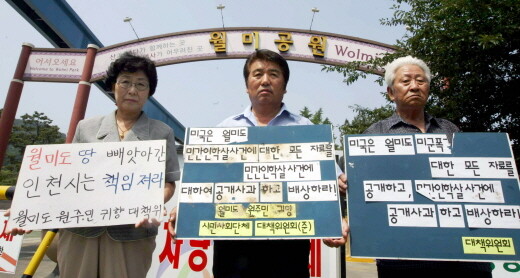hankyoreh
Links to other country sites 다른 나라 사이트 링크
Bereaved families continue 2,017-day sit-in on Wolmi Island

By Kim Min-kyeong
Jeong Ji-eun’s father Jeong Yong-gu died on Sept. 10, 1950. Jeong, 66, lost his father in the concentrated U.S. Air Force bombing of Wolmi Island prior to the Incheon Landing. His mother rushed home after witnessing the bombing from her parent’s home on Songdo, but her husband was already dead, his corpse unrecognizable. Her son was just six years old at the time.
It has been 60 years since the bombing, but Wolmi Island is still someone else’s land. A U.S. military facility was built on the island during the war. In 1971, it was handed over to the Korean Navy, which sold it in 2001 to the city of Incheon. The city has turned it into “Wolmi Park.”
The residents of Wolmi Island, who were forced from their home with just the clothes on their back, have been demanding to be allowed to return home since 1952, but have only been told by the government that Wolmi Island was being used as a military facility. Recently, the Defense Ministry and Incheon City government have been trying to pass off responsibility, saying the land was not theirs, and that they were not responsible for the residents being forced out.
The only result that has been won was a decision by the Truth and Reconciliation Commission of Korea (TRCK). In 2008, TRCK ruled that it could not confirm that the United States made efforts to reduce civilian casualties despite the possibility that it was aware of the existence of civilian homes on Wolmi Island, and this violated the principles in international humanitarian law and the laws of war of distinguishing civilians and proportionality. The commission advised the U.S. and South Korean governments to undertake a joint investigation, accept joint responsibility, undertake a commemorative project and assist residents of the island in returning.
Despite these recommendations, nothing changed. A sit-in strike by bereaved families demanding an investigation and compensation for their losses, which began on Oct. 7, 2004, continued for its 2,017th day Thursday. The bereaved family members continue the strike two at a time in a building constructed using wood planks taken from the homes removed from Wolmi Island. Six of the 30 people that began the strike have since died, while those that survive are frequently ill.
“Why is it that we, who have suffered for 60 years after our families were killed or forced off of Wolmi Island, are being ignored while the Incheon Landing is being promoted as the battle that changed the war and the basis for South Korea to develop?” asked Han In-deok, the 66-year-old chairman of the families’ committee.
Not many people are listening to them. The city of Incheon is spending 28 billion Won ($23.45 million) to build a memorial park for the Incheon Landing as part of the 60th anniversary of the war, and together with the Defense Ministry it plans to hold a commemorative event.
“It is good that they are holding a reenactment of the Incheon Landing,” said Kim Gyeong-un, 72, “but afterwards, they should also inform people about our pain.”
Please direct questions or comments to [englishhani@hani.co.kr]
Editorial・opinion
![[Column] Park Geun-hye déjà vu in Yoon Suk-yeol [Column] Park Geun-hye déjà vu in Yoon Suk-yeol](https://flexible.img.hani.co.kr/flexible/normal/500/300/imgdb/original/2024/0424/651713945113788.jpg) [Column] Park Geun-hye déjà vu in Yoon Suk-yeol
[Column] Park Geun-hye déjà vu in Yoon Suk-yeol![[Editorial] New weight of N. Korea’s nuclear threats makes dialogue all the more urgent [Editorial] New weight of N. Korea’s nuclear threats makes dialogue all the more urgent](https://flexible.img.hani.co.kr/flexible/normal/500/300/imgdb/original/2024/0424/7317139454662664.jpg) [Editorial] New weight of N. Korea’s nuclear threats makes dialogue all the more urgent
[Editorial] New weight of N. Korea’s nuclear threats makes dialogue all the more urgent- [Guest essay] The real reason Korea’s new right wants to dub Rhee a founding father
- [Column] ‘Choson’: Is it time we start referring to N. Korea in its own terms?
- [Editorial] Japan’s rewriting of history with Korea has gone too far
- [Column] The president’s questionable capacity for dialogue
- [Column] Are chaebol firms just pizza pies for families to divvy up as they please?
- [Column] Has Korea, too, crossed the Rubicon on China?
- [Correspondent’s column] In Japan’s alliance with US, echoes of its past alliances with UK
- [Editorial] Does Yoon think the Korean public is wrong?
Most viewed articles
- 1‘We must say no’: Seoul defense chief on Korean, USFK involvement in hypothetical Taiwan crisis
- 2N. Korean delegation’s trip to Iran shows how Pyongyang is leveraging ties with Moscow
- 3Amnesty notes ‘erosion’ of freedom of expression in Korea in annual human rights report
- 4‘Weddingflation’ breaks the bank for Korean couples-to-be
- 5[Reportage] On US campuses, student risk arrest as they call for divestment from Israel
- 6[Column] Park Geun-hye déjà vu in Yoon Suk-yeol
- 7Korea sees more deaths than births for 52nd consecutive month in February
- 8Will NewJeans end up collateral damage in internal feud at K-pop juggernaut Hybe?
- 9[Guest essay] The real reason Korea’s new right wants to dub Rhee a founding father
- 10[Editorial] New weight of N. Korea’s nuclear threats makes dialogue all the more urgent